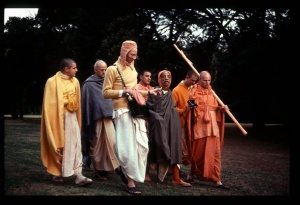CC Madhya 20.328 (1975): Difference between revisions
(Vanibot #0027: CCMirror - Mirror CC's 1996 edition to form a basis for 1975) |
(Vanibot #0020: VersionCompareLinker - added a link to the Version Compare feature) |
||
| Line 2: | Line 2: | ||
<div style="float:left">'''[[Sri Caitanya-caritamrta (1975)|Śrī Caitanya-caritāmṛta (1975)]] - [[CC Madhya (1975)|Madhya-līlā]] - [[CC Madhya 20 (1975)|Chapter 20: Lord Śrī Caitanya Mahāprabhu Instructs Sanātana Gosvāmī in the Science of the Absolute Truth]]'''</div> | <div style="float:left">'''[[Sri Caitanya-caritamrta (1975)|Śrī Caitanya-caritāmṛta (1975)]] - [[CC Madhya (1975)|Madhya-līlā]] - [[CC Madhya 20 (1975)|Chapter 20: Lord Śrī Caitanya Mahāprabhu Instructs Sanātana Gosvāmī in the Science of the Absolute Truth]]'''</div> | ||
<div style="float:right">[[File:Go-previous.png|link=CC Madhya 20.327 (1975)|Madhya-līlā 20.327]] '''[[CC Madhya 20.327 (1975)|Madhya-līlā 20.327]] - [[CC Madhya 20.329 (1975)|Madhya-līlā 20.329]]''' [[File:Go-next.png|link=CC Madhya 20.329 (1975)|Madhya-līlā 20.329]]</div> | <div style="float:right">[[File:Go-previous.png|link=CC Madhya 20.327 (1975)|Madhya-līlā 20.327]] '''[[CC Madhya 20.327 (1975)|Madhya-līlā 20.327]] - [[CC Madhya 20.329 (1975)|Madhya-līlā 20.329]]''' [[File:Go-next.png|link=CC Madhya 20.329 (1975)|Madhya-līlā 20.329]]</div> | ||
{{CompareVersions|CC|Madhya 20.328|CC 1975|CC 1996}} | |||
{{RandomImage}} | {{RandomImage}} | ||
==== TEXT 328 ==== | ==== TEXT 328 ==== | ||
<div class="verse"> | <div class="verse"> | ||
:indra-sāvarṇye | :indra-sāvarṇye 'bṛhadbhānu' abhidhāna | ||
:ei caudda manvantare caudda | :ei caudda manvantare caudda 'avatāra' nāma | ||
</div> | </div> | ||
| Line 25: | Line 24: | ||
<div class="translation"> | <div class="translation"> | ||
"In the Indra-sāvarṇya-manvantara, the avatāra was named Bṛhadbhānu. These are the names of the fourteen avatāras in the fourteen manvantaras. | |||
</div> | </div> | ||
| Line 32: | Line 31: | ||
<div class="purport"> | <div class="purport"> | ||
Śrīla Bhaktisiddhānta Sarasvatī Ṭhākura, in his Anubhāṣya, gives a list of Manus and their | Śrīla Bhaktisiddhānta Sarasvatī Ṭhākura, in his Anubhāṣya, gives a list of Manus and their fathers' names: (1) Svāyambhuva Manu, the son of Lord Brahma; (2) Svārociṣa, the son of Svarociḥ, or Agni, the predominating deity of fire; (3) Uttama, the son of King Priyavrata; (4) Tāmasa, the brother of Uttama; (5) Raivata, the twin brother of Tāmasa; (6) Cākṣuṣa, the son of the demigod Cakṣu; (7) Vaivasvata, the son of Vivasvān, the sun-god (whose name is also mentioned in Bhagavad-gītā ([[BG 4.1 (1972)|4.1]])); (8) Sāvarṇi, a son born to the sun-god and wife named Chāyā; (9) Dakṣa-sāvarṇi, the son of the demigod Varuṇa; (10) Brahma-sāvarṇi, the son of Upaśloka; (11-14) Rudra-sāvarṇi, Dharma-sāvarṇi, Deva-sāvarṇi and Indra-sāvarṇi, the sons of Rudra, Ruci, Satyasahā and Bhūti respectively. | ||
</div> | </div> | ||
Latest revision as of 13:16, 27 January 2020

A.C. Bhaktivedanta Swami Prabhupada
TEXT 328
- indra-sāvarṇye 'bṛhadbhānu' abhidhāna
- ei caudda manvantare caudda 'avatāra' nāma
SYNONYMS
indra-sāvarṇye—in the Indra-sāvarṇya-manvantara; bṛhadbhānu—the avatāra named Bṛhadbhānu; abhidhāna—named; ei caudda manvantare—in the fourteen manvantaras; caudda—fourteen; avatāra—of the incarnations; nāma—different names.
TRANSLATION
"In the Indra-sāvarṇya-manvantara, the avatāra was named Bṛhadbhānu. These are the names of the fourteen avatāras in the fourteen manvantaras.
PURPORT
Śrīla Bhaktisiddhānta Sarasvatī Ṭhākura, in his Anubhāṣya, gives a list of Manus and their fathers' names: (1) Svāyambhuva Manu, the son of Lord Brahma; (2) Svārociṣa, the son of Svarociḥ, or Agni, the predominating deity of fire; (3) Uttama, the son of King Priyavrata; (4) Tāmasa, the brother of Uttama; (5) Raivata, the twin brother of Tāmasa; (6) Cākṣuṣa, the son of the demigod Cakṣu; (7) Vaivasvata, the son of Vivasvān, the sun-god (whose name is also mentioned in Bhagavad-gītā (4.1)); (8) Sāvarṇi, a son born to the sun-god and wife named Chāyā; (9) Dakṣa-sāvarṇi, the son of the demigod Varuṇa; (10) Brahma-sāvarṇi, the son of Upaśloka; (11-14) Rudra-sāvarṇi, Dharma-sāvarṇi, Deva-sāvarṇi and Indra-sāvarṇi, the sons of Rudra, Ruci, Satyasahā and Bhūti respectively.